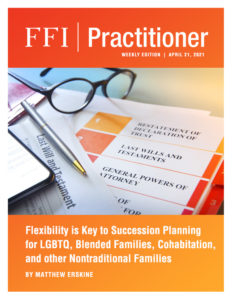
View this edition in our enhanced digital edition format with supporting visual insight and information.
Thanks to this week’s contributor, Matthew Erskine, for his article that explores the importance of building flexibility into the estate planning process for advisors working with nontraditional families.
When it comes to family firms, maintaining family control of the firm is often the primary goal, including for non-traditional families. This goal applies not only to the LGBTQ couples, but also for families where there is gray divorce, blended families and stepchildren, nonmarital cohabitation, single parents by choice, multinational families, children born through assisted reproductive technologies (ART), and transgender, gender non-binary, or gender-fluid individuals.
The key is drafting for flexibility, so that the wills, trusts, and other documents follow the client’s wishes, rather than leaving it to the courts to decide. Here are a few topics that advisors should consider when planning for family firm succession in nontraditional families:
- Gendered pronouns and definitions. Drafting to avoid gender specific pronouns is important; ideally, the advisor uses the individual’s name rather than a pronoun throughout these documents. Also, it can be important to draft provisions that explicitly include children conceived by ART. At the same time, DNA testing can result in a child inheriting assets from a parent he or she never knew, so clients may decide to exclude biological children, parents, or siblings who have no relationship with the family.
- Powers of appointment. Advisors should consider expanding the powers of appointment (POAs) to anyone other than creditors, the estate, themselves, or creditors of the estate. The incorporation of POAs into estate planning documents can add flexibility to plans but may require clients to come back for more frequent periodic reviews to fine-tune the implications of powers and other related concerns. Having this flexibility can help with non-traditional family members who might otherwise not be provided for under the law, or where the law puts them at a disadvantage on inheriting assets in an estate.
- Trust decanting/trust protector. If permitted in a client’s jurisdiction, advisors should consider provisions that explicitly allow for trust decanting (transferring trust assets into a new, different trust) and that allow a trust protector (a non-fiduciary appointment of a third party) to make amendments. This takes some thought as to who should hold the protector powers and consideration of the impact on the overall plan. Similar to a Power of Appointment, decanting a trust or using a trust protector can help offset some of the legal disadvantages that non-traditional family members may have in inheriting assets. By reformulating the trust, clients can also get a “second bite at the apple” on otherwise irrevocable trusts that may not change with the times.
- Marriage, divorce, remarriage, and nonmarital relationships. Because we cannot predict the future, planning has to deal with future marriage, divorce, and nonmarital partners with flexibility and precision, while at the same time protecting family privacy, e.g., by limiting the information included in wills, which will become public documents.
- Prenuptial agreements. Prenuptial agreements should be considered for any marriage, including in nontraditional families. Jurisdictional laws vary on what is procedurally necessary to make an enforceable agreement, but laws typically require that the agreement be voluntary, be not unconscionable, and include full disclosure of both parties’ financial affairs.
- Planning during marriage. Couples frequently seek to engage in joint estate planning and should discuss protection for all children, joint or otherwise, establishing joint trusts that become irrevocable at the death of the first spouse and that deal with the statutory elective share.
- Divorce. In nontraditional families, much like traditional families, issues such as beneficiary designations for life insurance, IRAs, other non-probate assets, wills, and trusts are all affected by divorce. In the US, most states’ laws will automatically revoke any revocable instrument (including a will) with respect to any bequest to a former spouse and, increasingly, bequests to family members of the ex-spouse. Despite this, the best practice is to take affirmative steps to ensure that if an ex-spouse is no longer to be a beneficiary, that the ex-spouse is removed as a beneficiary. Especially since revocation-upon-divorce statutes may not cover pension and insurance plans that are subject to state regulations, such as in the United States.
- Cohabitation. A big difference between cohabitants and spouses is that while marital gifts are sometimes tax-free and a surviving spouse can inherit any amount of the decedent spouse’s estate without current estate tax implications, sometimes a gift to a nonmarital cohabitant, or other members of nontraditional families, cannot qualify for this tax exemption. This requires more careful consideration of the estate tax consequences of legacies to members of non-traditional families.
- Cohabitation/nonmarital partner agreements. A cohabitation agreement protects a client in a similar manner to a prenuptial agreement. It controls how debts and expenses incurred during the relationship, such as mortgages or rental payments, should be treated. Additonally, where one party makes considerable changes in their lives with the promise of being a beneficiary of assets, the agreement can restrict the ability to change beneficiary designations on retirement accounts, insurance plans, or joint accounts. Joint child custody agreements are also important, as the non-traditional family member may otherwise have no legal rights enforceable by the Court.
- Advance medical directives. Clients should specify the type of end-of-life medical treatment that they want in a living will or similar document (e.g., do they want tube feeding). A second decision, particularly important where the client has remarried or has a nonmarital partner, is choosing who will be authorized to make health care decisions on the client’s behalf through a health care power of attorney. Note that, when an individual is hospitalized, stepparents may cut off access and information to their spouse’s children, or children may cut off access to a stepparent.A related concern is death and burial issues. A client should consider disputes between a surviving spouse, stepchildren, non-traditional family members, and more distant relations over when, where, and how the client is interred. Clients should specify their wishes in writing and clearly define who has the right to conduct the funeral and the burial. Better yet is for the client to make those decisions and have a prepaid funeral contract. Fights over interment often come down to emotional statements about who is and who is not part of the family, and those statements can be played out over where someone is to be buried, what rituals attend the burial, and even who can attend the funeral and where they are seated.
In this increasingly globalized economy, property ownership laws in different countries—and thus the laws governing distribution of property within different countries—mean that the laws of inheritance can vary widely, leading to very different outcomes than intended. In common law countries including the United States, the United Kingdom, and Canada, there generally exists much greater flexibility when it comes to an individual’s freedom to determine who should receive the individual’s property at death, including members of the nontraditional family. In these common law countries, an individual can draft wills and trusts to determine who will receive the individual’s property and in what proportions almost without restriction.
In the countries of the world that do not follow the common law tradition, a very different set of legal principles may apply with respect to inheritance and the amount of freedom an individual has to alter the default inheritance rules. In European countries and in Central and South America, the inheritance laws originate primarily in civil law, that is law that is controlled by statute and not by case law, which can be very rigid and detailed when it comes to property inheritance. This type of law is often referred to as Napoleonic law or Roman law. Middle Eastern countries usually follow Muslim inheritance laws, while African and Asian countries have a wide variety of hybrid approaches to inheritance that may include local customary law, civil law, and English common law elements.
The result is that, when there are assets located in several different countries, what will work in a common law country may not work in a civil law country. It is recommended that when clients have “offshore” assets, that they allocate certain foreign-located property to the members of the family best able to inherit the assets in that jurisdiction, and other property, in domestic or common-law jurisdictions, to other family members who can easily inherit in those jurisdictions. If the client’s desire is for everyone to get an equal share, the client can give a fiduciary the power to balance out the value of the gifts from the remainder of the estate.
With non-traditional families becoming more and more common, everyone—not just single-sex couples—needs to consider how best to build both flexibility and certainty into the estate planning and documentation. Issues of control over, and benefit from, assets—as well as more personal issues of custody of a child, health care decisions and even access to a gravely ill partner and the location of assets—also must be considered.
Disclaimer: The views expressed in this article are those of the author only. The information contained in this article is provided solely for informational purposes. This article does not constitute legal or tax advice or create an attorney-client relationship.
About the Contributor

Matthew Erskine is the managing partner of Erskine & Erskine LLC, a fourth-generation law firm, and The Erskine Company, LLC, a consulting firm. He focuses on strategic planning and legal services for business owners, professionals, individuals, families, collectors, and inheritors of unique assets, helping his clients and their families solve their problems through customized estate, tax, and management solutions. Matthew can be reached at m.erskine@erskineco.com.

View this edition in our enhanced digital edition format with supporting visual insight and information.





